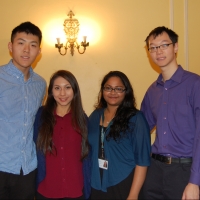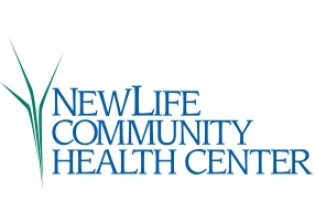
January 21 Community Health Talk: Diabetes Type I and II
By John Peck | January 21, 2017
Benjamin Franklin once said, "Tell me and I forget...teach me and I remember...involve me, and I learn."
That's something we see at the New Life Community Health Center as our patients involve themselves with us..and they learn. And we involve ourselves with them...and we learn together. And even our partners in preventive health care learn too and apply through real-world experience that will help their careers in the future.
On Saturday, January 21st, Asha Alex, our clinic's Director of Community Health, and three students from the St. John 's Pharmacy Program - Alex Chu, Shireen Farzadeh, and Andrew Kwong - delivered a health education talk on Type 1 and Type 2 diabetes. The three are also a part of an university association called “Committee Operation Diabetes,” whose aim is to raise awareness of this disease. The audience was primarily a group of about 20 'day worker' men who frequent our clinic for hygiene or free medical assistance, and are usually 'on the streets' after hours when a single day's hiring work is done - or on the streets from no work and no place to live at all.
As the St. John's students gave the presentation, we could see that this was going to be a lively and interactive group. This group had our presenters going more than just 'presenting'. We were involved. And learning with, and from each other. Alex, Shireen and Andrew helped our guys understand the signs and symptoms of Type 2 diabetes, explained healthier food options and emphasized the importance of exercise in order to reduce the risk of developing Type 2 diabetes.
The audience became more engaged and inquisitive, asking questions about their current eating habits and options for healthier alternatives. One man explained how he was recently diagnosed with diabetes and wanted to know whether fruits were OK for him to eat. Alex further explained how fruits contain natural sugars and the fiber which is found in fruits enables a more balanced absorption of the sugar into the body, as opposed to drinking soda which usually contains a high amount of processed sugar and lacks any nutritional value. Asha Alex MD MPH described how the glucose levels in the body change after meals and how insulin works. She encouraged the audience to choose healthier foods as often as possible and practice moderation when it comes to foods that are fried or processed.
It's important for those in a 'normal' world to understand that having a stable job, family, a place to live, and therefore a consistent means of maintaining diet, are not often an option for our 'day workers' who frequent our clinic. And understanding some basic health prevention issues won't be a 'basic' consideration for most. Later, a few members of the audience expressed there were many things in the presentation that they didn’t know, and how helpful the presentation was to them.
But most revealing, was what was revealed to ourselves about real-world prevention and on-the-street living. Especially for Shireen.
“It was a good opportunity to learn how to be sensitive", she said. "Since we knew the people we spoke to today would not be able to access certain foods, we had to omit certain slides we would have otherwise shown.”
Our best medical provision isn't the things we say, or the things we teach, but the touches to lives where we're teachable ourselves, and sensitive enough to become involved. We and our partners learned a lot on Saturday, too.




